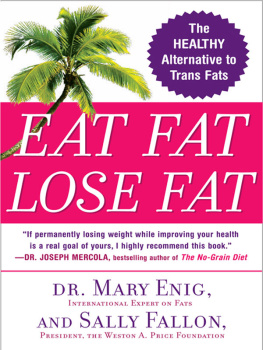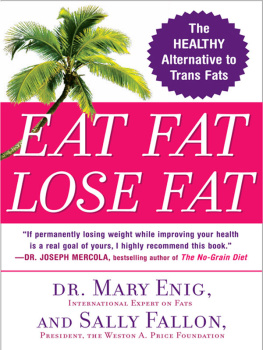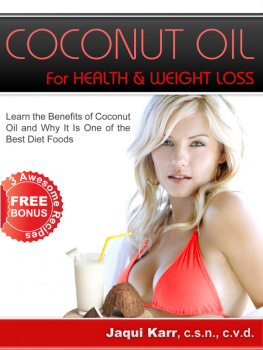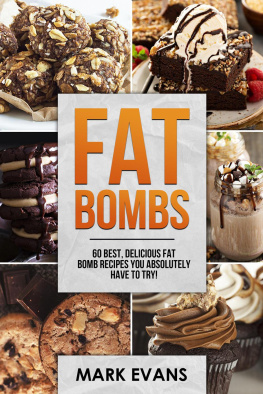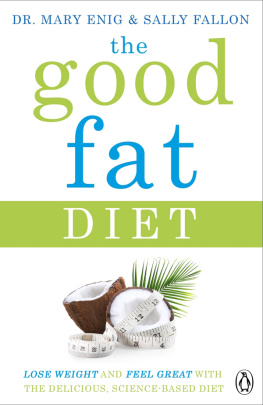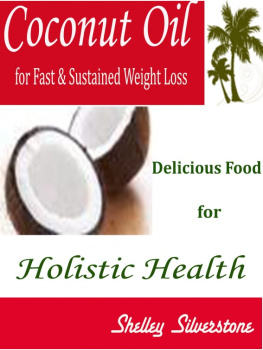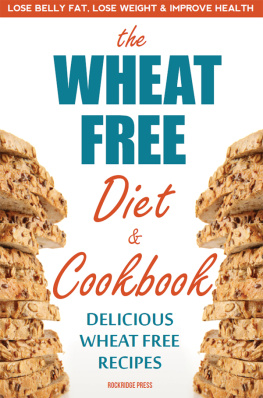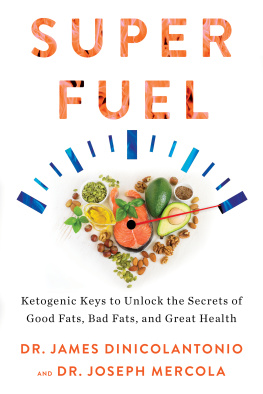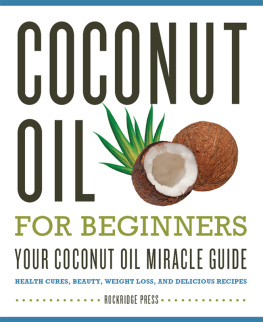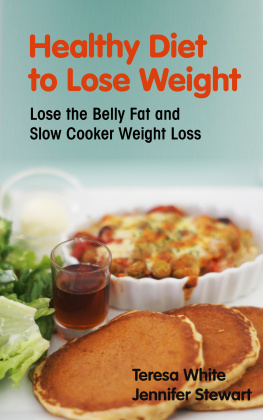Also by Sally Fallon and Dr. Mary Enig
Eat Fat, Lose Fat
Lose Weight and Feel Great with Three Delicious, Science-Based Coconut Diets
Dr. Mary Enig and Sally Fallon

HUDSON STREET PRESS
Published by the Penguin Group
Penguin Group (USA) Inc., 375 Hudson Street, New York, New York 10014, U.S.A.
Penguin Books (Canada), 10 Alcorn Avenue, Toronto, Ontario, Canada M4V 3B2
(a division of Pearson Penguin Canada)
Penguin Books Ltd, 80 Strand, London WC2R 0RL, England
Penguin Ireland, 25 St Stephens Green, Dublin 2, Ireland (a division of Penguin Books Ltd)
Penguin Books (Australia), 250 Camberwell Road, Camberwell, Victoria 3124, Australia
(a division of Pearson Australia Group Pty Ltd)
Penguin Books India Pvt Ltd, 11 Community Centre, Panchsheel Park, New Delhi110 017, India
Penguin Books (NZ), Cnr Airborne and Rosedale Roads, Albany, Auckland, New Zealand
(a division of Pearson New Zealand Ltd)
Penguin Books (South Africa) (Pty) Ltd, 24 Sturdee Avenue, Rosebank,
Johannesburg 2196, South Africa
Penguin Books Ltd, Registered Offices: 80 Strand, London WC2R 0RL, England
First published by Hudson Street Press, a member of Penguin Group (USA) Inc.
Copyright Mary Enig and Sally Fallon, 2005
All rights reserved

| REGISTERED TRADEMARKMARCA REGISTRADA |
CIP data is available.
ISBN: 978-1-1012-1322-3
Without limiting the rights under copyright reserved above, no part of this publication may be reproduced, stored in or introduced into a retrieval system, or transmitted, in any form, or by any means (electronic, mechanical, photocopying, recording, or otherwise), without the prior written permission of both the copyright owner and the above publisher of this book.
PUBLISHERS NOTE
Neither the publisher nor the authors are engaged in rendering professional advice or services to the individual reader. The dietary programs, recipes, resources, ideas, procedures, and suggestions contained in this book are not intended as a substitute for consulting with your physician. Consultation with your health practitioner is advised. The publisher and authors are not responsible for your specific health or allergy needs that may require medical supervision, for any adverse reactions to the dietary programs or recipes or products contained or referred to in this book, or for any loss or damage arising or allegedly arising from any information or suggestions in this book. While the authors have made every effort to provide accurate telephone numbers and Internet addresses at the time of publication, neither the publisher nor the authors assume any responsibility for errors, or for changes that occur after publication.
The scanning, uploading, and distribution of this book via the Internet or via any other means without the permission of the publisher is illegal and punishable by law. Please purchase only authorized electronic editions, and do not participate in or encourage electronic piracy of copyrighted materials. Your support of the authors rights is appreciated.
Acknowledgments
No one deserves more credit for making this book happen than Alison Rose Levyit was her vision, her conviction, and her organizational and writing skills that set this project in motion and then wove our input together in a creative and timely fashion.
Stephanie Golden then worked ceaselessly to give us a structural and finished manuscript, always with an eye to clarity and consistency.
Janis Vallely of Janis Vallely Authors Group kept the project moving smoothly; her advice and suggestions have been invaluable.
And Laureen Rowland of Hudson Street Press created a remarkable alchemypreserving our vision of what this book should be while molding it into a form that the public can embrace.
Many others contributed: Brian Shilhavy, with his coconut-info e-mail discussion board, provided important testimonials and feedback; members of the Weston A. Price Foundation, who were happy to provide their weight-loss and recovery stories; several creative cooks, who shared their recipes; and our own families, with their encouragement and support.
Finally, we must gratefully acknowledge Weston A. Price and many other scientists of integrity, willing to engage in the honest research that, although often unheralded, has provided guidelines to the use of coconut oil for weight loss, and whole foods for vibrant health.
Contents
Facts Versus Fears About Fats
Fats, the Real Deal
Know Your Fatsand Your Nutrients
Our Nutritional Approach to Weight Loss
Real Food, the World Over
Quick and Easy Weight Loss
Health Recovery
Everyday Gourmet
Coconut Recipes
Traditional Recipes
Resources
Part One
The Truth About Fats
Chapter One
Facts Versus Fears About Fats
Americas Anti-Fat Obsession
As the French maintain their trim physiques while consuming triple cream brie, steak au poivre, and barnaise sauce, most American adults would barely dare to drink a glass of whole-fat milk. For the last 25 years, government recommendations, medical doctrine, food advertising, and so-called health experts have stressed low-fat and non-fat foods, cautioning people to avoid fats in general, particularly saturated fats from animal products and tropical fats, like coconut.
Are you eating lots of foods high in fat (especially saturated fat) ? worries the American Heart Association website. Choose a diet that is low in saturated fat and cholesterol, echo the current (2000) United States Department of Agriculture (USDA) food guidelines. A scant two to three daily servings of dairy or other animal foodsspecified to be low-fat or fat-freeare recommended in the Food Pyramid (developed by the USDA and the U.S. Department of Health and Human Services). The National Heart, Lung and Blood Institute website offers heart healthy recipes with reduced fat content, such as Stuffed Potatoes made with soft margarine, low-fat cottage cheese, and low-fat milk.
Yet America, not France, is the nation with galloping rates of obesity, leading many people, and now many researchers, to wonder:
- Are the vegetable oils and trans fats contained in processed foods really healthier than the fats in natural foods, like butter and cream?
- Is coconut oil, a staple in countries with lower rates of chronic disease than ours, really so deadly?
How effective have the recommended low-fat diets and low-and non-fat foods really been, given that 97 million Americans (thats 64 percent, an 8.6 percent jump from 1994 to 1999) are overweight, according to a study published in the October 2002 Journal of the American Medical Association.
And weight gain is not just a question of appearance. Obesity was number two on the Centers for Disease Control and Prevention list of preventable causes of death in 2004 (after smoking). According to government statistics, being overweight substantially increases the risk of hypertension, type II diabetes, coronary heart disease, stroke, gallbladder disease, osteoarthritis, and respiratory problems, as well as endometrial, breast, prostate, and colon cancers. Higher body weight increases mortality for all causes.
If you are among the overweight and want to avoid these diseases, youre caught in a vicious cycle. Once the pounds pack on, your energy plummets, making it harder to exercise. Even if you only need to lose a few pounds, or are not overweight at all, you may find that you suffer from low energy, chronic fatigue, food cravings, and depression. Why?

